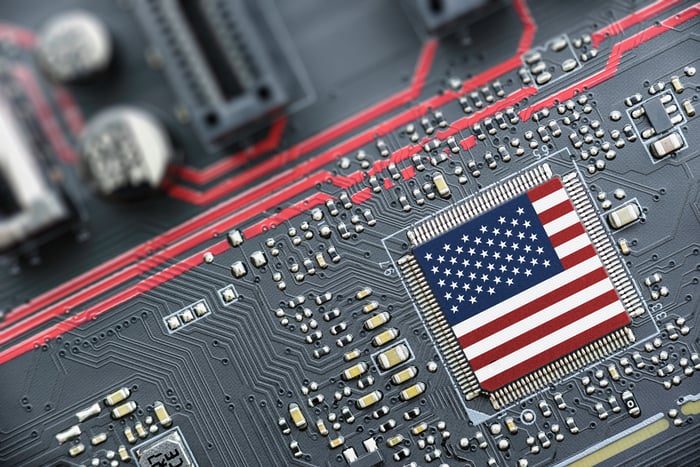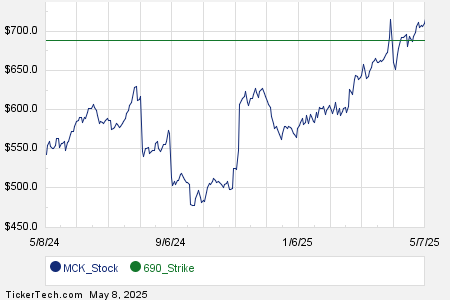Impact of Potential Semiconductor Tariffs on Key Tech Companies
Semiconductors play a crucial role in various devices, from cars to computers. Recently, President Trump indicated that tariffs on semiconductors are imminent. This declaration has prompted technology companies to quickly seek solutions to mitigate potential financial impacts.
According to research from The Motley Fool, the U.S. semiconductor supply chain is deeply interconnected with countries such as China, Taiwan, and Singapore. This complexity makes the prospect of tariffs particularly challenging. Below are two companies to watch closely if semiconductor tariffs are implemented.
1. Taiwan Semiconductor Manufacturing
Tariffs on semiconductors could significantly affect Taiwan Semiconductor Manufacturing (NYSE: TSM), the largest processor manufacturer globally. TSMC produces processors for major companies like Apple (NASDAQ: AAPL), Nvidia, and Qualcomm, accounting for approximately 90% of the world’s most advanced chips.
Should tariffs be enacted, TSMC might face higher production costs. This scenario could lead to increased prices for customers, subsequently elevating product prices across a wide range of devices that utilize TSMC’s chips.
During TSMC’s first-quarter earnings call in mid-April, CEO C.C. Wei addressed tariff concerns: “We recognize the uncertainties and risks posed by potential tariff policies. However, we have not observed any change in our customers’ behavior thus far. We still project our revenue for 2025 will rise by nearly 20% in U.S. dollars.”
Currently, TSMC plans to invest $165 billion in U.S. operations to boost chip production. This investment is aimed at meeting a growing demand among U.S. customers and may help offset future tariff costs.
Despite the strategy, TSMC cautions that impending semiconductor tariffs could introduce “uncertainties and risks.” The company expects to have a clearer outlook on the impact during the second quarter.
2. Apple Inc.
Apple has begun to feel the repercussions of existing tariffs, incurring $900 million in additional costs last quarter. Analysts warn that future tariffs could double these costs. This financial strain could worsen if semiconductor tariffs are put into effect, as Apple sources chips from Taiwan and several other Asian nations for its products.
Tariffs on semiconductors could drive up iPhone prices, compelling Apple to maintain its typical profit margins. Conversely, the company might absorb some costs to mitigate the impact on consumers.
Amid tariff uncertainty, Apple is adapting by increasing its domestic semiconductor sourcing. On a recent earnings call, CEO Tim Cook noted, “In calendar year 2025, we plan to source over 19 billion chips from various states, including advanced chips produced in Arizona.”
Additionally, Apple has committed to investing $500 billion in the U.S. over four years, partly to expand TSMC’s manufacturing capabilities in Arizona.
Nevertheless, Cook also acknowledged the unpredictability of tariff decisions: “I hesitate to predict because I am unsure of what will happen with tariffs.” He expressed difficulty in projecting developments beyond June.
Current Uncertainties
Both Taiwan Semiconductor and Apple are influential players in their industries but currently face significant uncertainties regarding tariffs. Investors should weigh these risks carefully when considering investments in either company.
This volatile tariff landscape does not necessarily warrant a complete withdrawal from investing in these stocks. However, adopting a cautious, wait-and-see approach might be prudent for potential investors.
Should You Invest in Taiwan Semiconductor Manufacturing Now?
Before investing in Taiwan Semiconductor Manufacturing, consider this:
The Motley Fool Stock Advisor analyst team has identified ten stocks they believe are optimal for investment currently. Taiwan Semiconductor Manufacturing did not make this list, indicating that other stocks could offer greater returns in the foreseeable future.
For instance, when Netflix was recommended on December 17, 2004, an investment of $1,000 would now be worth approximately $623,103!* Similarly, if Nvidia had been bought on April 15, 2005, that same investment would have grown to $717,471!*
It’s also noteworthy that the average return for Stock Advisor stands at 909%, outpacing the S&P 500’s 162%. Don’t miss out on their latest top ten list by joining Stock Advisor.
*Stock Advisor returns as of May 5, 2025
Chris Neiger has positions in Apple. The Motley Fool has positions in and recommends Apple, Nvidia, Qualcomm, and Taiwan Semiconductor Manufacturing. The Motley Fool has a disclosure policy.
The views expressed herein are those of the author and do not necessarily reflect those of Nasdaq, Inc.




